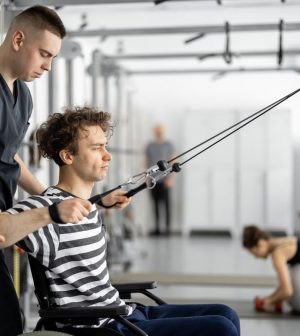- Could Your Grocery Store Meat Be Causing Recurring UTIs?
- Are You Making This Expensive Thermostat Error This Winter?
- Recognizing the Signs of Hypothyroidism
- 10 Strategies to Overcome Insomnia
- Could Artificial Sweeteners Be Aging the Brain Faster?
- Techniques for Soothing Your Nervous System
- Does the Water in Your House Smell Funny? Here’s Why
- Can a Daily Dose of Apple Cider Vinegar Actually Aid Weight Loss?
- 6 Health Beverages That Can Actually Spike Your Blood Sugar
- Treatment Options for Social Anxiety Disorder
Early Physical Therapy Key for Concussion Recovery, Study Shows

Turns out, starting physical therapy earlier after a concussion may significantly improve recovery outcomes.
A new study published recently in the Physical Therapy & Rehabilitation Journal followed just over 200 adults recovering from mild traumatic brain injuries, or concussions, who were within two to 12 weeks from their injury.
Researchers found that those who started physical therapy within two months of their injury reported fewer symptoms, better balance, and quicker reaction times compared to those who delayed therapy.
Participants were split into two groups: 82 began physical therapy just seven days after joining the study (around 56 days post-injury), while 121 waited six additional weeks (around 99 days post-injury).
Both groups completed eight therapy sessions over six weeks, focusing on balance, cervical spine exercises, and cardiovascular health, alongside a home program.
“There seems to be a window of opportunity within two months,” Laurie King, senior study author and professor of neurology at Oregon Health & Science University, said in a news release.
“After that point, the brain compensates in a way that’s not good.”
For the estimated 30% of people who experience persistent symptoms — including dizziness, balance issues, and cognitive challenges — King emphasized the importance of timely intervention. “Correctly identifying this group is the challenge,” she noted.
The researchers noted that delayed PT patients appeared to rely more on vision to maintain balance, suggesting the vestibular system in the inner ear had not fully recovered.
Meanwhile, early therapy participants showed quicker recovery of vestibular balance.
“We have people who come in and say they’re fine,” King concluded. “Then when we challenge them to turn their head while looking at a fixed point, they’re like, ‘Whoa, that makes me feel sick.’”
More information
The Cleveland Clinic has more on concussions.
SOURCE: Physical Therapy & Rehabilitation Journal, study, Dec. 18, 2024; OHSU, news release, Dec. 19, 2024; The Washington Post, media report, Jan. 5, 2025
Source: HealthDay
Copyright © 2026 HealthDay. All rights reserved.










